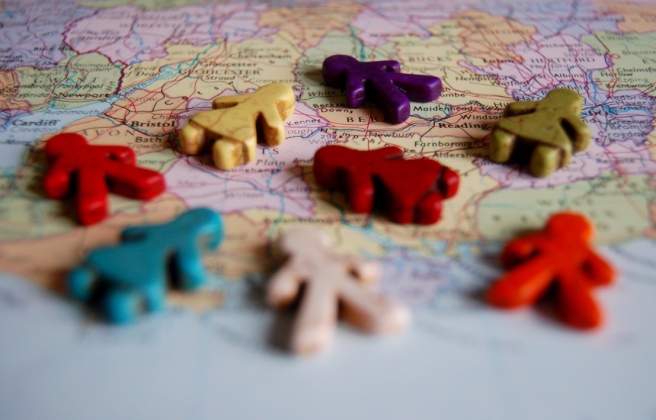
A couple of weeks ago I had the chance to share some of the thoughts I’ve had and things I’ve learned about being neighbourly in the 21st century. Around 40 women had gathered to share breakfast and friendship, and to hear about an amazing charity called The Gate which works with women in the sex trade in Southampton. I had the privilege of putting the work of The Gate in the wider context of a call to be radically neighbourly in our day to day lives.
So who is our neighbour? When I was studying at university, a friend lent me a book called ‘Lift the Label’ which had a profound impact on my thinking. Throughout my teenage years I had become increasingly conscious that whilst I lived a reasonably comfortable existence, others did not. And I could and should do something about it. ‘Lift the Label’ challenged my thinking and framed some of the ideas I was exploring and trying to articulate for myself. When considering who our neighbour is, I like the definition that the authors use: “whoever needs you to be”.
Our neighbour is whoever needs our compassion and our mercy. In this increasingly globalised world, the parameters of who our neighbour is have broadened greatly. Before I leave the house in the morning, I’ve gotten washed, dressed and drunk my morning coffee. I might not have said a single word by that point, but I’ve interacted with the people who made my soap, who grew the cotton for my jeans and the beans for my coffee, who sewed my clothes together and transported them to this country…These people need my compassion and mercy; they are my neighbours too.
I believe that each of us has an arsenal of tools with which we can make a positive difference in people’s lives.
- Our money: not just giving to organisations that align with our values, but thinking about where we spend it. Are the people making our clothes earning a good wage, or are they risking their lives for my next skirt?
- Our time: getting involved in local community initiatives that are making a difference to people on our doorsteps. People whose lives we may have little insight into until we get to know them. I learned much about my Northern Irish linen factory heritage from a woman at the breakfast club I volunteer at here in Southampton!
- Our skills: things that we find easy may be a struggle for others. Or perhaps they lack the time when yours is free. DIY, budgeting, babysitting… Let’s recognise first that we all have something to offer and second, that we don’t just have to keep the benefit to ourselves.
- Our influence: our family, friends, colleagues… we each have a unique sphere of influence. As well as posting a picture of our latest coffee on social media, we can share what we’re passionate about, the social justice issues we’re learning about. We can talk about it over the dinner table, down the pub, in the work kitchen. And we can have influence over corporations too, using our consumer power to raise the expectations on them.
When we begin to delve into the need for social action, locally and further afield, it can feel overwhelming. So many hurts, so many people, so many injustices. I believe that the thing is to start. Begin to understand the people our lives touch, the choices we can make, and believe that you as an individual can genuinely make a difference.
A few months ago I watched the brilliant BBC drama production of ‘An Inspector Calls’. Until then I was unfamiliar with the tragic tale of Eva Smith following her series of encounters with a particular family, but since then it’s rather haunted me. I’ll leave you with the author J.B. Priestley’s words, spoken by his inspector:
“There are millions and millions of Eva Smiths and John Smiths still left with us, with their lives, their hopes and fears, their suffering and chance of happiness, all intertwined with our lives, and what we think, and say, and do. We don’t live alone upon this earth. We are members of one body. We are responsible for each other.”
Today’s soundtrack: Bethel Music // We Will Not Be Shaken
One thought on “Being neighbourly”